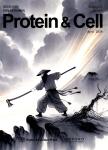Tackling the tumor microenvironment: what challenge does it pose to anticancer therapies?
Tackling the tumor microenvironment: what challenge does it pose to anticancer therapies?作者机构:Institute of Health Sciences Shanghai Institutes for Biological Sciences Chinese Academy of Sciences Shanghai 200031 China School of Medicine Shanghai Jiao Tong University Shanghai 200025 China VA Seattle Medical Center Seattle WA 98108 USA Department of Medicine University of Washington Seattle WA 98195 USA
出 版 物:《Protein & Cell》 (蛋白质与细胞(英文版))
年 卷 期:2014年第5卷第11期
页 面:816-826页
核心收录:
学科分类:0710[理学-生物学] 0831[工学-生物医学工程(可授工学、理学、医学学位)] 1007[医学-药学(可授医学、理学学位)] 071010[理学-生物化学与分子生物学] 1002[医学-临床医学] 07[理学] 100214[医学-肿瘤学] 0703[理学-化学] 0836[工学-生物工程] 10[医学]
基 金:supported by the US Department of Defense (DoD) Prostate Cancer Research Program (PCRP) Idea Development (New Investigator) Award to Y.S. 中组部千人计划
主 题:tumor microenvironment DNA damage,secretory phenotype therapy resistance genotoxicity,clinical intervention
摘 要:Cancer is a highly aggressive and devastating disease, and impediments to a cure arise not just from cancer itself. Targeted therapies are difficult to achieve since the majority of cancers are more intricate than ever imagined. Mainstream methodologies including chemotherapy and radiotherapy as routine clinical regimens frequently fail, eventually leading to pathologies that are refractory and incurable. One major cause is the gradual to rapid repopulation of surviving cancer cells during intervals of multiple-dose administration. Novel stressresponsive molecular pathways are increasingly unmasked and show promise as emerging targets for advanced strategies that aim at both de novo and acquired resistance. We highlight recent data reporting that treatments particularly those genotoxic can induce highly conserved damage responses in non-cancerous constituents of the tumor microenvironment (TMEN). Master regulators, including but not limited to NF-kB and C/EBP-β, are implicated and their signal cascades culminate in a robust, chronic and genome-wide secretory program, forming an activated TMEN that releases a myriad of soluble factors. The damage-elicited but essentially off target and cell non-autonomous secretory phenotype of host stroma causes adverse consequences, among which is acquired resistance of cancer cells. Harnessing signals arising from the TMEN, a pathophysiological niche frequently damaged by medical interventions, has the potential to promote overall efficacy and improve clinical outcomes provided that appropriate actions are ingeniously integrated into contemporary therapies. Thereby, anticancer regimens should be well tuned to establish an innovative clinical avenue, and such advancement will allow future oncological treatments to be more specific, accurate, thor- ough and personalized.



